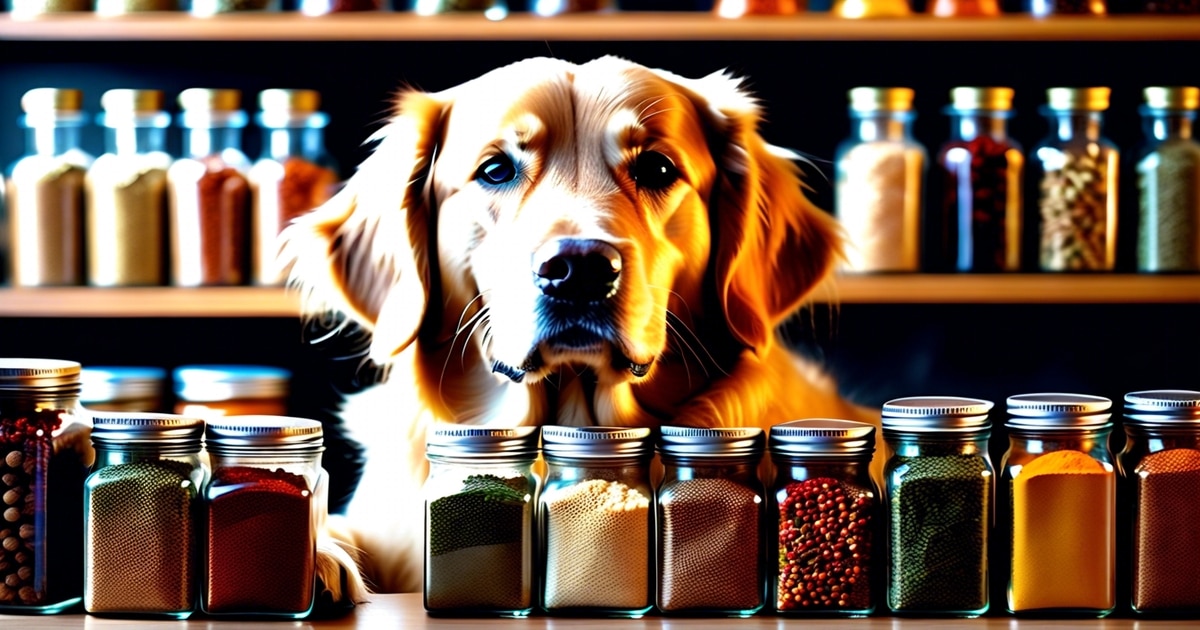Key Takeaways
-
Be Mindful of Allspice Toxicity: Allspice contains compounds that can be toxic to pets, so it’s crucial to avoid feeding them this spice.
-
Recognize Toxicity Symptoms: Familiarize yourself with the symptoms of allspice poisoning in pets, such as vomiting, diarrhea, and lethargy, to take prompt action if needed.
-
Choose Pet-Safe Spices: Opt for safe spices like turmeric and ginger when preparing pet foods, and avoid using allspice to prevent potential harm to your pets.
-
Consult Nutritional Facts: Understand the nutritional content of allspice and its potential effects on pets to make informed decisions about their diet.
-
Act Quickly in Emergencies: If you suspect your pet has ingested allspice, seek veterinary care immediately to mitigate any potential health risks.
-
Implement Preventive Measures: Take proactive steps to prevent accidental allspice ingestion by pets, such as storing spices securely and keeping them out of reach.
Curious about whether allspice is safe for your furry friend? Many pet owners wonder, “Can pets eat allspice?” Knowing which human foods are safe for pets and which can be harmful is essential. In this post, we’ll delve into pets consuming allspice. We’ll explore its potential effects on different animals and provide insights into keeping your beloved companions healthy and happy.
Identifying Toxic Compounds in Allspice
Eugenol: The Toxic Compound
Allspice contains eugenol, a compound that is toxic to pets. When consumed by pets, eugenol can lead to various health issues, including gastrointestinal upset and central nervous system depression.
Eugenol is found in many common household items such as essential oils, perfumes, and spices like allspice. Pet owners need to be aware of the presence of Eugenol in all situations and its potential hazards to their furry companions.
Recognizing the Potential Dangers Pet owners should be cautious about allowing their pets access to allspice foods due to their toxicity. Even small amounts of allspice can adversely affect pets’ health, making it crucial for pet owners to understand the potential dangers of this spice.
Pet parents must keep harmful substances like allspice out of reach from their pets and ensure they are well informed about which human foods are safe for their furry friends.
Allspice Toxicity Symptoms in Pets
Symptoms of Allspice Toxicity
Pets consuming allspice may experience vomiting and diarrhea. These symptoms are often the initial signs of allspice poisoning. Pets might display signs of lethargy and weakness, indicating a more severe reaction to the toxic compounds present in allspice.
Allspice contains substances that can have harmful effects on pets’ health, leading to various symptoms associated with toxicity. Pet owners must recognize these signs as potential indicators of allspice poisoning in their beloved animals.
Understanding the Signs
Recognizing the side effects of allspice consumption is essential for pet owners to seek veterinary care when necessary promptly. Liver toxicity is another serious concern related to allspice ingestion by pets, which can manifest through symptoms such as jaundice or yellowing of the gums and eyes.
Pet owners should be vigilant about any unusual behavior or physical changes in their pets after exposure to allspice. Awareness of these signs enables them to take immediate action by contacting a veterinarian for guidance and treatment.
Comparing Safe and Unsafe Spices for Pets
Understanding Pet-Safe Spices

Pets can safely consume certain spices, such as cinnamon, in moderation. These spices may even offer health benefits due to their anti-inflammatory properties. Pet owners must distinguish between safe and unsafe spices to ensure the well-being of their furry friends.
Spices like cinnamon are known for their potential health advantages, including anti-inflammatory effects. These spices can be a safe addition to your pet’s diet when used in small amounts. However, it’s crucial to consult with a veterinarian before introducing any new spice or ingredient into your pet’s meals.
Identifying Harmful Spices
On the other hand, some spices, like allspice, pose significant risks to pets if ingested. Allspice contains compounds that can be toxic to animals and may lead to various poisoning symptoms. For instance, pets might experience vomiting, diarrhea, or even more severe issues after consuming allspice.
Pet owners must recognize which spices should be kept from their pets’ reach. While some herbs and seasonings could benefit animals when used cautiously under professional guidance, others can harm their health.
Nutritional Facts: The Truth About Allspice and Pets
Lack of Nutritional Value
Pets like dogs do not derive significant health benefits from consuming allspice. This spice does not offer any substantial nutritional advantages for pets. It lacks essential nutrients that contribute to their overall well-being. Therefore, it’s important to understand that while some spices may have health benefits for humans, they might not necessarily provide the same advantages for pets.
Allspice doesn’t contribute to a pet’s balanced diet. Relying on spices like allspice can lead to an imbalance in their diet, potentially negatively affecting their heart rate, digestion, and overall health.
Balanced Diet Importance
Pet owners must ensure that their pets’ diets are balanced without the reliance on spices such as allspice. A vet-approved diet tailored specifically for pets is essential in maintaining their health and well-being. Instead of incorporating unnecessary spices into a pet’s diet, focusing on high-quality pet food with appropriate nutrients is key.
-
Allspice offers no significant nutritional value for pets.
-
Relying on allspice can lead to an imbalanced diet for pets.
-
Emphasizing the importance of a balanced and vet-approved diet tailored specifically for pets.
Managing Allspice Poisoning in Pets
Seeking Immediate Veterinary Care
If a pet ingests allspice, seeking immediate veterinary care is crucial. Vomiting may need to be induced to remove the allspice from the pet’s system. This is because allspice can have adverse effects on pets.
Allspice contains compounds that can be toxic to pets, leading to various health issues such as gastrointestinal problems, nervous system depression, and potentially affecting the heart and liver. Therefore, prompt, professional medical attention is necessary.
Understanding Critical Management Steps
Understanding critical management steps is essential when dealing with allspice poisoning in pets. These may include inducing vomiting if the ingestion has occurred recently and providing supportive care for any symptoms or complications that arise.
Pet owners must be aware of the potential dangers associated with certain human foods like allspice when consumed by their pets. By being informed about these risks, they can take proactive measures to prevent accidental ingestion and know what to take in an emergency.
Safe Spice Alternatives for Pet Foods
Exploring Safe Spices
It’s important to consider safe alternatives. One such alternative is turmeric, which adds flavor and offers potential health benefits for pets. Turmeric contains curcumin, known for its anti-inflammatory properties that can aid in managing certain health conditions in pets.
Another safe spice option is ginger, which can be used as an alternative to allspice in pet diets. Ginger helps alleviate nausea and digestive issues in pets, making it a beneficial addition to their meals. Introducing new spices gradually into your pet’s diet and monitoring them closely for any adverse reactions is essential.
Incorporating these safe spices into homemade treats or meals at a dog bakery can provide variety and potential health benefits for your furry friends. For example, adding a pinch of turmeric or ginger to homemade dog biscuits can enhance the flavor while offering added nutritional value.
Pet-Friendly Options
When considering different spices as part of your pet’s diet, remember that not all human foods are safe for pets. While some foods like broccoli are healthy options, others like allspice should be avoided due to their potential toxicity to animals. Therefore, exploring suitable spice alternatives provides flavorful and safe options for your pets’ meals.
To ensure the safety of incorporating new spices into your pet’s diet, consult a veterinarian before making any significant changes. They can guide appropriate quantities and combinations of spices based on your pet’s specific needs and dietary requirements.
Preventing Accidental Allspice Ingestion in Pets

Storing Spices Safely
It’s crucial to keep them out of reach of pets. Store these items in high cabinets or locked cupboards. This prevents curious pets from accessing them.
Pets, especially dogs, are known for their curiosity and tendency to explore their surroundings with their noses and mouths. Therefore, being cautious when cooking with allspice is essential. Keep an eye on your pet while cooking and ensure they don’t have access to the kitchen counters or spilled spices.
Implementing Preventive Measures
To prevent accidental ingestion by pets, consider implementing measures such as using baby gates or barriers to restrict access to the kitchen during meal preparation. Educating family members about the dangers of certain foods and ensuring everyone is on board with keeping allspice and other dangerous substances away from pets can help avoid potential incidents.
Pet owners need to know which ingredients are safe for their furry friends. When preparing homemade treats or meals for your pets, ensure you use only ingredients safe for consumption by animals like dogs and cats. Always double-check recipes before giving your pet any food containing unfamiliar ingredients.
When to Seek Veterinary Care for Spice Ingestion
Understanding the Urgency
If your pet consumes allspice or any other toxic substances, it’s crucial to understand when to seek professional veterinary care. The urgency of seeking veterinary attention for pet spice ingestion cannot be overstated. Even if the symptoms seem mild initially, prompt action is essential.
In severe cases, allspice ingestion can lead to serious health issues in pets. It can adversely affect their digestive system and may cause symptoms such as vomiting, diarrhea, abdominal pain, and even neurological problems. Therefore, it’s important not to underestimate the potential dangers of pet spice poisoning.
Importance of Prompt Action
The importance of prompt action when dealing with potential spice poisoning in pets cannot be emphasized enough. If you suspect your pet has ingested allspice or any other harmful substance, contacting a veterinarian immediately is crucial. Delaying veterinary care can exacerbate the situation and risk your pet’s health.
Swift action is key. By seeking timely veterinary care, you can ensure that appropriate measures are taken to address any adverse effects of allspice ingestion on your pet’s health.
Final Remarks
In conclusion, pet owners need to know about the dangers of allspice and other spices. They should know what can make pets sick, what to look for if their pet gets sick, and what to do if it eats something bad. Pet owners can keep their pets safe by using safe spices and keeping spices away from pets. If a pet seems sick from eating spices, it’s important to immediately take them to the vet.
For further information on pet nutrition and safety, consult a qualified veterinarian to receive personalized guidance and recommendations tailored to your pet’s needs.
Frequently Asked Questions
Can pets eat allspice?
No, pets should not consume allspice. Allspice contains compounds that can be toxic to pets and may lead to poisoning symptoms.
What are the symptoms of allspice toxicity in pets?
Symptoms of allspice toxicity in pets may include vomiting, diarrhea, abdominal pain, lethargy, and decreased appetite. In severe cases, it can lead to organ damage or failure.
Are there safe spice alternatives for pet foods?
Yes, there are several safe spice alternatives for pet foods, such as turmeric, ginger, and cinnamon. These spices can add flavor and nutritional benefits without harming your pet’s health.
When should I seek veterinary care for spice ingestion by my pet?
If you suspect your pet has ingested allspice or any other potentially toxic substance, it is important to seek veterinary care immediately. Prompt treatment can prevent serious complications and ensure your pet’s well-being.
How can I prevent accidental allspice ingestion in my pets?
Store spices securely out of reach to prevent accidental ingestion of allspice by your pets. Be cautious when cooking or baking with spices around curious pets, and always clean up spills promptly.

